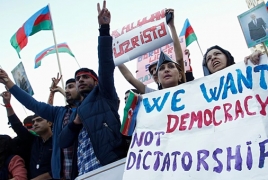
Richard Kauzlarich, an adjunct professor at George Mason University and former U.S. ambassador to Azerbaijan and to Bosnia and Herzegovina, presents an article on the current situation on human rights and freedom of speech in Azerbaijan. According to him, quiet diplomacy does not work in such cases. The article reads with slight reductions:
Almost all the news coming out of Azerbaijan these days is bad. On August 9, an independent Azerbaijani journalist, Rasim Aliyev, was beaten and killed. A few days later, civil society activists Leyla and Arif Yunus were sentenced to lengthy prison terms on politically-motivated charges. And on September 1, a court sentenced award-winning journalist, Khadija Ismaylova, to seven and a half years in jail on absurd charges of tax evasion, illegal business activity, and abuse of power.
Just this past week, the election-monitoring arm of the Organization for Security and Cooperation in Europe announced it would not send a mission to Azerbaijan’s upcoming parliamentary elections because of restrictions the government in Baku tried to impose on the size of the mission. This will leave the November 1 election without serious outside monitoring. Ismaylova is a fearless journalist who has done path-breaking reporting on corruption in Azerbaijan, much of it linked to the Aliyev regime. For several years, she has been the target of government-driven intimidation and blackmail. She was arrested last year, and her sentencing, after spending more than half a year in jail awaiting her hearing and verdict, is a devastating — albeit not surprising — blow to media freedom in Azerbaijan. Since Azerbaijan’s rigged presidential elections in October 2013, Ilham Aliyev’s regime has been on a rampage against any and all perceived enemies — foreign and domestic. Opposition figures, journalists, and civil society activists are slandered, investigated, and treated as enemies of the state. It was only a matter of time before one of those targets would pay the ultimate price.
Rasim Aliyev (no relation to President Aliyev) died in a Baku hospital on August 9 after being beaten the previous day by what he said from his hospital bed was a group of supporters of a soccer player whom he had criticized on Facebook. It remains unclear whether his assailants were in fact connected to the soccer player.
President Aliyev said he considers the murder a “threat to the freedom of speech and information” and “will personally supervise the investigation.” That’s rich coming from the leader of a country that the U.S.-based Committee to Protect Journalists describes as the leading jailer of journalists in Europe and Central Asia. The Representative on Freedom of the Media for the Organization for Security and Cooperation in Europe (OSCE) counts more than 10 members of the media in prison or pre-trial detention in Azerbaijan. The murders of journalists Elmar Huseynov (2005) and Rafiq Taghi (2011) remain unsolved.
Even those who have fled Azerbaijan under duress continue to face the heavy hand of the Aliyev regime. Emin Milli, living in exile in Berlin and director of Meydan TV — an independent Azerbaijani media outlet in Germany — has received death threats, seen his brother-in-law jailed, and witnessed 23 of his relatives coerced into making a public statement accusing him of “betrayal.” Three female journalists working with Meydan TV were briefly detained last week at Baku airport on their way to a professional training course in Kiev but released soon after.
The U.S. State Department, by contrast, issued a far weaker statement, saying the United States was “deeply troubled” by the prison sentences. In response to the murder of Rasim Aliyev, tthe U.S. issued a statement from its embassy in Baku; nothing was said in Washington. The United States was once again “deeply troubled” by Ismailova’s sentencing, according to the State Department deputy spokesman.
Instead of condemning these developments in the strongest terms, the U.S. recently sent three envoys — Special Envoy Amos Hochstein, Deputy Assistant Secretary Richard Hoagland, and U.S. Deputy Assistant Secretary of Defense Evelyn Farkas — to Baku to discuss energy, Trans-Caspian, and security issues, respectively. Even as the human rights situation gets worse by the day, Farkas reportedly declared Azerbaijan a “strategic partner” of the United States.
Quiet diplomacy does not work. Statements indicating the U.S. is “deeply troubled” by gross human rights abuses have no effect. Visits by senior U.S. officials are spun as indications of U.S. support for the regime, whereas those who call out human rights abuses are denigrated as anti-Azerbaijani, or worse. This sad impasse must be reversed and fast.
Azerbaijani officials engaged in gross human rights abuses should be sanctioned. Investigations should be launched into the massive corruption that is central to the Azerbaijani regime. And political prisoners must be released. Together, the U.S. and the EU must move beyond words, to actions.

